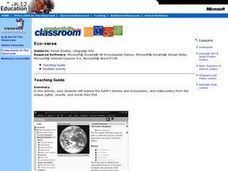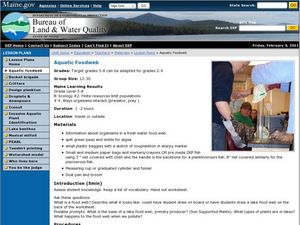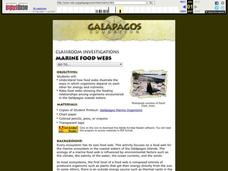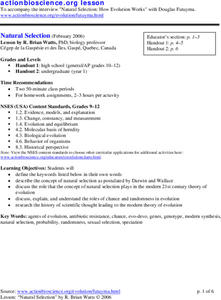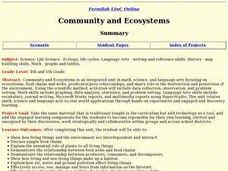Curated OER
Eco-Poetry
Students explore the Earth's various biomes and ecosystems using Internet research. They create a multimedia poem using the photos, sounds, and vocabulary from their research.
Curated OER
Aquatic Foodweb
Students explore what a food web is. In this science instructional activity, students examine how nutrients and other pollutants enter a lake and play a food web game whereby students pretend they are either zooplankton,...
Curated OER
What is Wrong with My Pond?
Students examine various pond water samples to identify water quality. For this water quality lesson, students will identify levels of nitrates, ammonia, pH, hardness,and alkalinity in pond water. They will explain importance of water...
Curated OER
Economic Use of Public Natural Areas
Students examine the public controversy between the use of public natural areas for economic activities by viewing video clips, researching on the Internet, and calculating sustainable land.
Curated OER
Marine Food Webs
Learners examine how food webs illustrate the ways in which organisms depend on each other for energy and nutrients, and make food webs showing the feeding relationships among organisms encountered in the Gal??pagos coastal waters.
Curated OER
Natural Selection
Students use discussion questions, handout information and research topics to explore several issues related to natural selection and evolution. They examine Darwin's research on the finch and antibiotic resistance.
Curated OER
All About Ants
Students create model ants in order to study the characteristics of insects such as body segments, number of legs, and feelers, as well as how these characteristics serve the insect.
Curated OER
Community and Ecosystems
Students complete a unit of lessons on ecosystems. They participate in online activities, create a diorama, write journal entries, and develop a Hyperstudio multimedia project on a selected ecosystem.
Curated OER
Biomes -- Part 1
Students use the internet to locate and gather information on the world's biomes. They compare and contrast biomes to ecosystems and describe the human effects on ecosystems. They answer questions to end the activity.
Curated OER
Biomes -- Part II
Students use the internet to gather information on the biomes of the world. They identify the climate and unique characteristics of each biome along with any threat to them. They create their own campaign to preserve wildlife.
Curated OER
Design Your Own Biological Experiment
Young scholars work together to research a topic of interest to them. They form hypothesis and complete experiments testing them. They present their findings to the class.
Curated OER
Extinct Animals Of The Louisiana Purchase
Students investigate two extinct species of birds that existed during the time of the Louisiana Purchase in Arkansas. They conduct research to describe the characteristics of the bird and look for the causes for its eventual extinction.
Curated OER
The Environment and Interactions of Living Organisms
Young scholars study the environment and interactions of living organisms. They identify abiotic and biotic factors and create a foldable and vocabulary cards. They create a poster illustrating soil and watch a video to study symbiosis.
Curated OER
Blue Planet: Seas of Life
Students study coral reefs and marine communities. In this investigative lesson plan students get into groups and are assigned a subject. In their groups they create a poster about their assigned topic.
Curated OER
What's a Swamp Good For?
Students identify the function and value of wetlands. In this instructional activity on appreciating wetlands, students explain how different household items can represent different aspects of the wetlands.
Curated OER
What's in Our Woods?
Young scholars observe their local forest and document the change that occurs over the school year. For this forestry lesson, students utilize a GPS to mark a certain area of the woods as their study area for the remainder of the...
Curated OER
How do rice farmers make good use of the land they use for planting rice?
Second graders discuss how farmers grow rice. In this rice growing lesson, 2nd graders see the optimal condition for land in order to grow rice. They experiment with clay and garden soil to see which holds water better.
Curated OER
What are rice farmers doing to help the environment with their water-filled rice fields?
Third graders research rice fields. In this rice fields lesson, 3rd graders discuss how fields contribute to the environment by providing an important food source for birds. They find the benefits of rice fields to water and soil as...
Curated OER
Blue Planet: Open Ocean
Students research facts about animal species. In this ocean lesson students view a video, prepare illustrated cards and create a food-web display.
Curated OER
Species Diversity and Phylogeny
Students explore the classification system of organisms: taxonomy. They examine prepared slides of Protozoans and record information on a Taxonomy Recording Sheet. Two additional classifying activities are also included in this lesson.
Curated OER
"Julie of the Wolves"
Fifth graders research life in Alaska and compare life there to their lives in this lesson. They read "Julie of the Wolves." They research through the novel and other reference books facts about the Alaskan climate and geography. They...
Curated OER
Water Quality
Students examine water quality and how to improve it, how to measure it and how it relates to human activities. In this water quality instructional activity students sample water from different sources, and test the samples.
Curated OER
Acid Rain: Where Have All the Rainbows Gone?
Learners study the pH scale and sources of acid precipitation. In this acid rain instructional activity students complete a lab on acid rain then complete a handout.
Curated OER
The Changing Coral Reef Community Game
Students examine organisms that inhabit the coral reefs and their living requirements. In this coral reef lesson students chart population changes and play a game.
